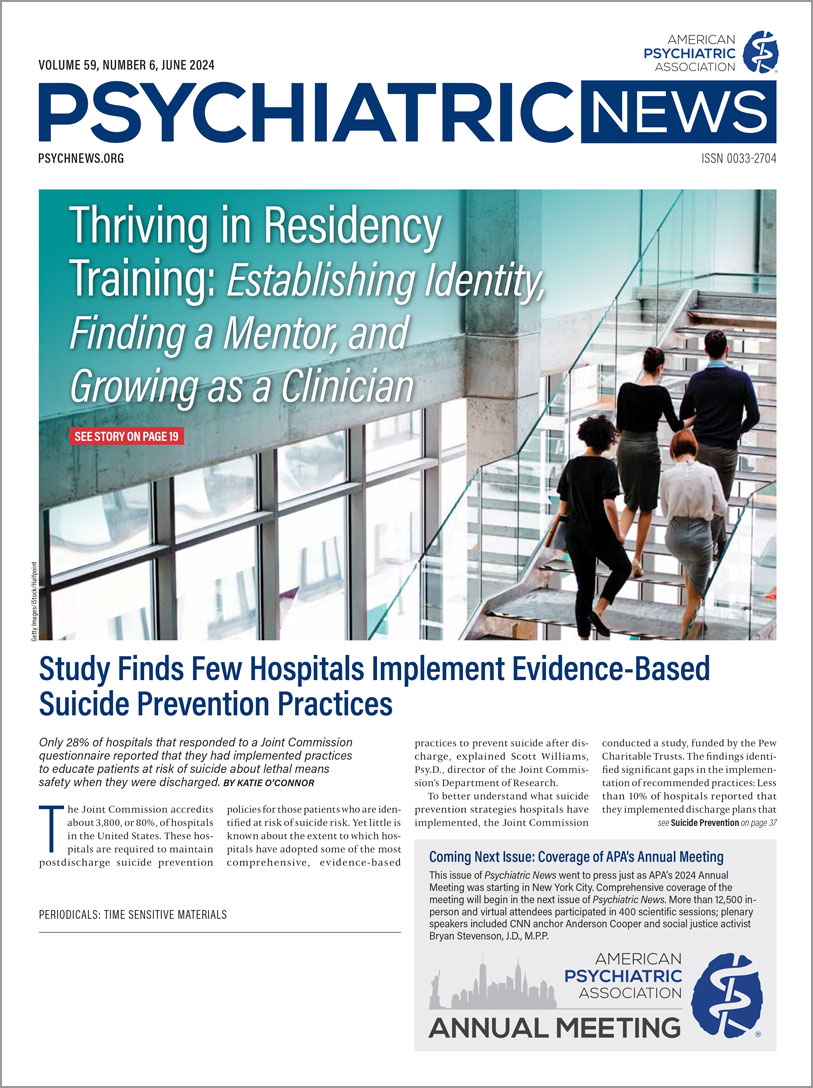APA’s Government, Policy, and Advocacy Update (July 2023)
APA Urges Caution About ‘Preaddiction’ Term
APA is urging the National Institute on Drug Abuse (NIDA) and the National Institute on Alcohol Abuse and Alcoholism (NIAAA) to conduct more research on the efficacy of using the term “preaddiction” as a preventive measure for substance use disorder (SUD) development and consider alternative preventive measures.
The recommendation came in response to a NIDA and NIAAA request for information on using the term “preaddiction” for identifying and intervening in potentially clinically significant substance misuse and/or early-stage SUDs within health care settings. The term preaddiction, NIDA and NIAAA stated, could raise public awareness about potentially harmful patterns of substance use, spur greater use of screening and brief interventions in clinical settings, prevent overdoses, and promote the development of new interventions.
APA pointed out in its letter to NIDA and NIAAA that there has been little to no research on the efficacy of the term preaddiction to prevent or mitigate SUD development. Comparing the term with the term “prediabetes,” APA continued, falls short, “as standardized physiological measures can be taken to confirm prediabetes and diabetes risk, whereas there is no such standard that currently exists for ‘preaddiction’ testing.”
The term could also lead to greater stigmatization of individuals who have been diagnosed with preaddiction, equity issues, and discriminatory insurance practices, APA noted, and urged comprehensive analyses before formalizing the term in a clinical context.
“APA supports the goals of developing meaningful and feasible screening tools for risk of SUDs together with brief, early interventions that are broadly accessible and may alter trajectories toward SUDs,” the letter stated, noting that these tools may be most effective in integrated care settings.
Pursuing Equity in Mental Health Act Reintroduced
In May, Reps. Bonnie Watson Coleman (D-N.J.) and Grace Napolitano (D-Calif.) reintroduced the Pursuing Equity in Mental Health Act. The bill was originally introduced in 2019 following a report from the Congressional Black Caucus’s Emergency Task Force on Black Youth Suicide and Mental Health titled “Ring the Alarm: The Crisis of Black Youth Suicide in America.” Sen. Bob Menendez (D-N.J.) introduced a companion bill in the Senate.
The bill responds to alarming increases in the rates of suicide among Black children, particularly those between the ages of 5 and 12 years. Numerous studies have pointed to historic increases in the suicide rates of Black youth, including Black teenagers. The Pursuing Equity in Mental Health Act continues to be reintroduced in the House and Senate each year. The bill has passed the House several times with bipartisan support but has yet to receive a vote in the Senate (Congress Considering Bills to Curb Black Youth Suicide).
APA strongly supports the bill, which would authorize $995 million in grants and other funding to support research, build a culturally competent workforce, support outreach programs that reduce stigma, and develop training programs for health care professionals to manage health disparities. The bill also promotes efforts to integrate mental health and primary care in an effort to ensure underserved populations have greater access to mental health care.
“Our youth, particularly Black youth and other youth of color, are experiencing a mental health crisis,” APA CEO and Medical Director Saul Levin, M.D., M.P.A., said in a news release. “Congress must continue to prioritize youth mental health and funding for mental health programs.”
Group of Six Firmly Opposes Medicaid Work Requirements
APA and its advocacy partners emphasized their firm opposition to Medicaid work requirements in a news release issued in late April. The organizations, collectively known as the Group of Six, include APA, the American Academy of Family Physicians, the American Academy of Pediatrics, the American College of Obstetricians and Gynecologists, the American College of Physicians, and the American Osteopathic Association.
In the statement, the organizations pointed to the experiences of states that have previously implemented work requirements. Such instances demonstrate that work requirements do not improve employment rates but can lead to higher administrative costs for states and increase medical debt and barriers to care for patients.
“Any proposals to impose punitive requirements run counter to the core tenets of Medicaid and our responsibility as physicians: improving equitable access to high-quality health care,” the statement reads.
Medicaid work requirements had been suggested by Congressional Republicans during debt ceiling talks, but they were ultimately left out of the final agreement. Work requirements for the Supplemental Nutritional Assistance Program (SNAP) were expanded in the final deal, however. ■



